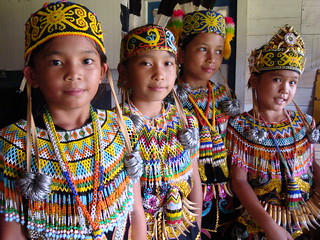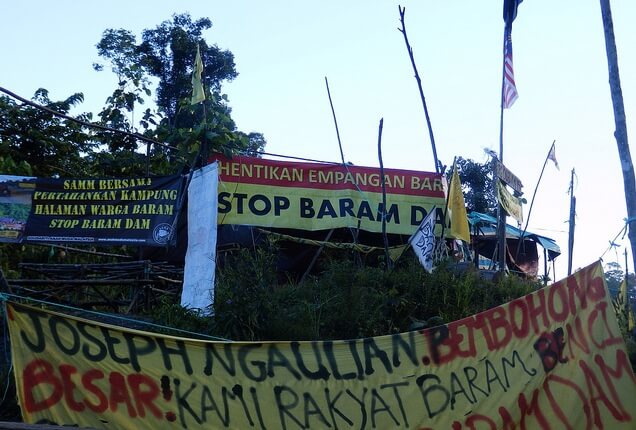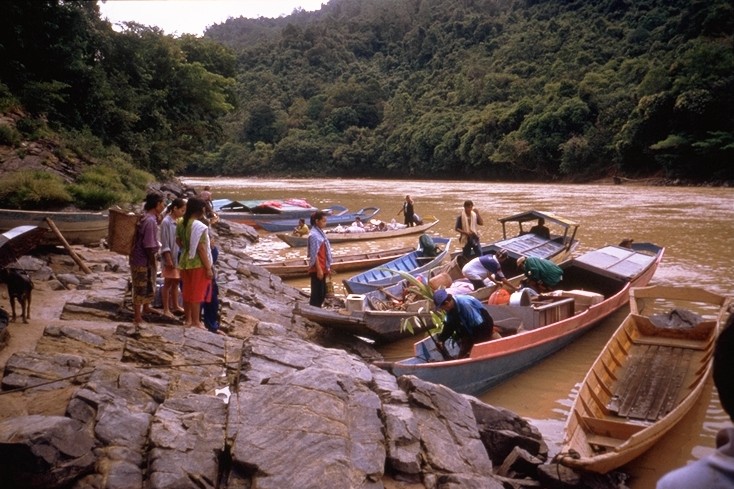 The Kenyah, also known as orang ulu – ‘upriver people’ along with their close neighbours the Kayan – are based in Sarawak and East Kalimantan the Malaysian and Indonesian sections of Borneo respectively. They may also be referred to as a Bahau people, a generalizing term which belies the fact that the term Kenyah is itself a grouping term referring to over forty groups with similar migration histories, customs and dialects and to over one hundred and ten communities. These groups generally speak a variety of the six Kenyah languages which all belong to the Austronesian language family.
The Kenyah, also known as orang ulu – ‘upriver people’ along with their close neighbours the Kayan – are based in Sarawak and East Kalimantan the Malaysian and Indonesian sections of Borneo respectively. They may also be referred to as a Bahau people, a generalizing term which belies the fact that the term Kenyah is itself a grouping term referring to over forty groups with similar migration histories, customs and dialects and to over one hundred and ten communities. These groups generally speak a variety of the six Kenyah languages which all belong to the Austronesian language family.
Based on the Indonesian and Malaysian Censuses from they year 2000 there are 44,350 Kenyah inhabiting areas of East Kalimantan and 24,906 areas of Sarawak. Many of this population inhabit the river headwaters of the Balui and Baram in areas of tropical jungles whilst others have more recently moved to live in more urbanized coastal areas. Along the rivers Kenyah people live/lived in very large community longhouses, usually at a confluence to ensure good transport by canoe. In their traditional homelands the Kenyah are swidden agriculturalists, cutting and burning small areas of forest to grow dry rice on hill padi, they also hunt and gather to supplement their diets. Most remain agriculturalists in some form today. Kenyah groups are also well known as exceptional craftsmen, boatsmen and for their ceremonies in which they display their prowess as both singers and dancers. In pre-modern times the the Kenyah practiced an animistic religion known as Bungan, but as a result of missionary activity most are now Christians whilst some have converted to Islam.
The Kenyah consider their origins to lie at the source waters of the Kayan river and appear to have inhabited the area they remain in for considerably longer than other groups. It is also established fact that the Kenyah had a great rivalry with Iban and Land Dayak peoples with whom they warred frequently and vied with in head hunting feuds. Much of the persecution felt by this group later in their history has been shared by their Kayan cousins as both have undergone religious suppression and had political power in their own lands wrested from them. The power of self determination was effectively taken from the Kenyah as a result of Charles Brooke’s expedition in 1863 which drove into the heart of Kenyah-Kayan territory with help from rival Iban warriors*. This resulted in a prodigious loss of life, ending the resistance of these peoples to rule the of the Rajah of Sarawak. The Brooke regime which followed this bloody campaign ensured that it’s legacy was felt and suppressed numerous traditional practices including the head hunting for which the area is well know. Since this time the Kenyah have adopted certain beliefs and customs such as the aforementioned religious orientations, though Christian churches and rituals in the area often still contain aspects of Bungan worship.
Today the Kenyah face issues similar to those encountered by many indigenous populations who inhabit valuable tropical forests. Lacking efficient protective measures illegal logging occurs frequently on Kenyah communal lands as companies such as Samling Timber seek to exploit their resources. When logging occurs legally the Kenyah often do not receive the benefits they are legally entitled to as stakeholders in the land. They continue to fight for their land title and to oppose illegal intrusions and extractions.
* Morrison, H, 1968, Sarawak. Donald Moore Press Ltd, Singapore.



